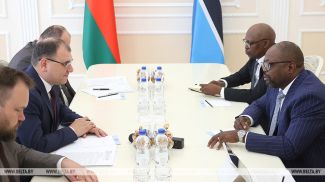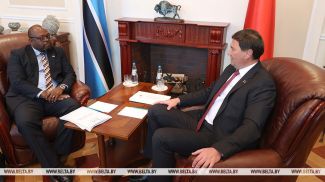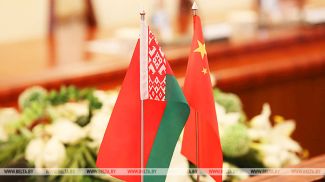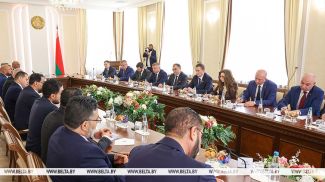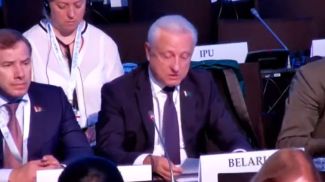MINSK, 25 November (BelTA) – Belarus' parliamentary delegation led by Chair of the Council of the Republic of the National Assembly Natalya Kochanova took part in the international parliamentary conference “Universal health coverage and the Sustainable Development Goals”, BelTA has learned.
The event was held in a videoconference format. It was organized by the CIS Interparliamentary Assembly together with the WHO Regional Office for Europe (WHO/Europe).
In her speech, Natalya Kochanova spoke about Belarus' progress towards achieving the Sustainable Development Goals, described the country's healthcare system and the government's efforts to combat the pandemic. “The pandemic that has swept the world has demonstrated the importance of a solid public health system and preparedness to deal with emergencies in every country. In such an environment, it is critical to build capacity to meet new challenges and find ways to achieve universal health coverage,” she said.
“From the very beginning, Belarus has been following its own path. We chose this path deliberately, as we knew that the Belarusian healthcare system would cope with this challenge. We have created a prompt decision-making system, clear-cut coordination and control on the ground, an extensive network of healthcare delivery in inpatient and outpatient settings, a solid bed capacity. We have enough practitioners and researchers. There is a multi-tier system of public health and epidemiology services; each region has infectious diseases hospitals. The COVID-19 response efforts are under personal control of President Aleksandr Lukashenko,” Natalya Kochanova said.
The operational centers have been set up in each region and the capital city for the rapid exchange of information and response. They are headed by the chairmen of the regional and Minsk city administrations. The hospitals are repurposed depending on the epidemiological situation. Vaccination sites were set up not only in healthcare facilities. Pop-up COVID-19 vaccination clinics have been set up at enterprises, shopping centers, educational institutions, social services departments. Mobile teams have been deployed, too. Production of personal protective equipment and disinfection has been organized. Work is nearing completion to localize the Sputnik V vaccine production. Belarus is also developing its own vaccine.
Belarus' healthcare organizations continue to provide emergency care, routine medical care, including high-tech surgeries. The state keeps close attention on certain categories of the population. Elderly, people with disabilities receive medical care at home. This includes tests, doctor visits, delivery of prescriptions. Obstetric-gynecological and perinatal medical care has not been stopped. A system of assistance to mothers and children has been clearly built. Work continues to build and refurbish healthcare facilities, to fit them with high-tech medical equipment.
"The effectiveness and mobility of our healthcare system have again been tested in the situation on the Belarusian-Polish border. We are concerned about the situation of refugees, especially pregnant women, children and the elderly. When it comes to life and health, we, Belarusians, do not divide people into our own and others. For our part, we are doing everything necessary for these people. We have deployed medical teams who provide medical examinations and consultations. If necessary, people are taken to hospital. We have also offered vaccination for those who wish. However, it is obvious: political decisions are needed at the international level," the speaker said.
“Belarus is always ready to share its best practices. We are open to cooperation with all interested partners for a stable, healthy and prosperous world. The COVID-19 pandemic has shown that amid the spread of infectious diseases in today's globalized world, countries cannot act in isolation. Such challenges can only be successfully addressed by joint international effort. Together we must build a system of comprehensive pandemic preparedness and response that ensures public health and safety. The number one priority is to establish sustainable contacts and exchange best practices to achieve the Sustainable Development Goals and counteract the COVID-19 pandemic,” Natalya Kochanova stressed.
In her words, the task for MPs is to develop a reliable and transparent legislative framework to regulate response mechanisms and effectively enforce laws in the area of health emergencies. “We need to constantly exchange parliamentary practices and develop inter-parliamentary communication on these issues. It is our common duty to today's and future generations to prevent new epidemics and pandemics. May COVID-19 be the last pandemic in human history,” the speaker said.
Speaking at the plenary session of the conference were WHO Regional Director for Europe Hans Kluge, heads of parliamentary delegations, heads of the relevant the CIS councils, ministries and agencies of the CIS member states, heads of partner international organizations and representatives of the expert community.
The conference featured panel discussions on “The Role of Parliaments in Legislating the Right of Access to Public Health and Medical Care amid a Pandemic” and “The Right to Universal Health Coverage: Universal Access to Quality Healthcare and Financial Risk Protection”.





